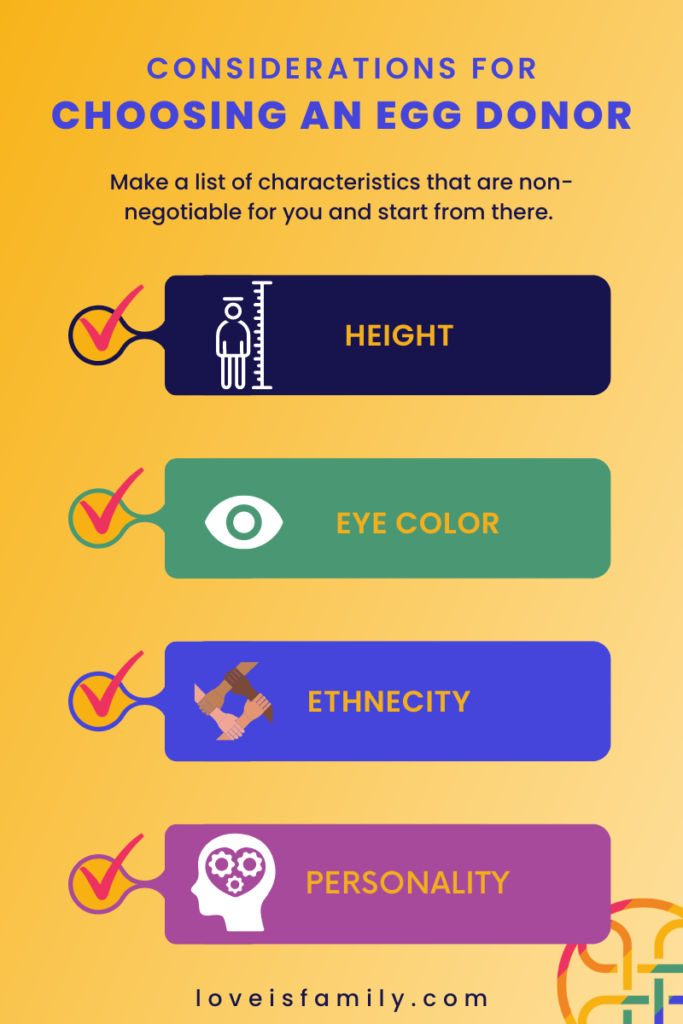At some point during your journey to parenthood, the question of whether you should consider an egg donor may come up. This is a decision that only you can make with the guidance of your fertility specialist. If you find that using donated eggs is the right path, you may wonder how to ensure that the donor you choose is the best match for your family.
Here are some things to consider as you make your decision to work with an egg donor.
What is the Role of an Egg Donor? Who Needs Egg Donors?
Donor eggs are an option for anyone who does not produce eggs or who, for any reason, is unable to or does not wish to use their own eggs. People seeking egg donation come from all walks of life. Heterosexual couples dealing with infertility, single parents, and LGBTQ+ couples can all have reasons why egg donation may be the best option for their needs. Additionally, people with a known genetic disease in their family may also choose to use an egg donor to avoid the risk of passing on the genetic disease to their children.
How Using an Egg Donor Works
 Egg donors provide healthy eggs for individuals or couples who are unable to or who choose not to use their own eggs. In most cases, this means choosing a donor through your fertility clinic, a donor agency working with your clinic, or an egg bank. In some cases, prospective parents may work with a family member or friend (provided they meet the same guidelines that any other donor would require). The donated eggs are fertilized in a lab setting with either a partner’s sperm or the donor’s sperm, and the resulting embryos are transferred to the person who is planning to carry the baby — the prospective parent or a gestational carrier (surrogate). You can expect a successful live birth rate of about 65% per transfer, depending on the clinic you work with.
Egg donors provide healthy eggs for individuals or couples who are unable to or who choose not to use their own eggs. In most cases, this means choosing a donor through your fertility clinic, a donor agency working with your clinic, or an egg bank. In some cases, prospective parents may work with a family member or friend (provided they meet the same guidelines that any other donor would require). The donated eggs are fertilized in a lab setting with either a partner’s sperm or the donor’s sperm, and the resulting embryos are transferred to the person who is planning to carry the baby — the prospective parent or a gestational carrier (surrogate). You can expect a successful live birth rate of about 65% per transfer, depending on the clinic you work with.
Factors to Consider when Choosing an Egg Donor
 While fertility clinics and donor agencies thoroughly screen egg donors for medical and psychological issues before allowing them to donate, there are many factors to consider when making your choice. Take some time to think about what is most important to you when it comes to your future child, but remember that no one person is likely to possess all the traits you might be looking for. Even children genetically related to both parents are unique and may not display the same physical, emotional, or intellectual traits as their parents.
While fertility clinics and donor agencies thoroughly screen egg donors for medical and psychological issues before allowing them to donate, there are many factors to consider when making your choice. Take some time to think about what is most important to you when it comes to your future child, but remember that no one person is likely to possess all the traits you might be looking for. Even children genetically related to both parents are unique and may not display the same physical, emotional, or intellectual traits as their parents.
That said, it may be a good idea to make a list of characteristics that are non-negotiable for you and start from there. For instance, many parents ideally want their children to resemble them physically. Choosing a donor with physical traits similar to your own — such as similar hair and eye color, height, build, and ethnicity — can increase the likelihood of having offspring with similar characteristics.
The same applies to personality, though to a lesser degree. Donor profiles can give you a sense of the donor’s personality and worldview, which you may find helpful. However, how much this will influence the personality of your child-to-be is an open question. While genetics play a role in shaping personality, in the nature-vs-nurture equation, nurture seems to have a much larger effect — and that effect begins while the child is still in the womb. Adopting healthy habits and managing stress levels before and during pregnancy doesn’t affect the genetic makeup of the child, but it can affect the way genes are expressed.
Medical and Physiological Factors to Consider
Donor criteria may vary slightly from clinic to clinic, but all donors undergo thorough medical screening. This includes obtaining a thorough medical and family health history and completing psychological screening. This can give you some degree of insight into the broader health picture of the potential donor. Donors undergo testing for infectious diseases and genetic testing for known inheritable conditions. Donors are generally required to have a BMI in the healthy range (18.5 to 24.9), to be non-smokers, and they cannot have a history of illicit drug use. Every clinic or agency will also limit donors’ ages around the peak years for egg quality and quantity. Within the Pinnacle Fertility network, donors must be between the ages of 20 and 29.
Types of Donor Arrangements
Prospective parents may decide to use frozen eggs, which are available immediately, or they may opt to receive fresh eggs, which may necessitate syncing the donor and recipient cycles.
When fresh eggs are used, they must be fertilized on the day they are retrieved from the donor. After this, the resulting embryos will be grown in the laboratory typically for 5-6 days. If preimplantation genetic testing of the embryos is going to be performed, the embryos will be frozen and will be available for use once the results are available.
If genetic testing is not going to be performed, the prospective parent has the option of a fresh embryo transfer, which will require their uterus to be ready generally five days after the retrieval. Synchronization between the embryo and the uterus is essential! Choosing a clinic with an in-house egg donor program can help ensure the process goes smoothly.
You must also decide whether to limit your choices to proven egg donors. Proven donors are those whose eggs have already proven successful for other recipients. While previous outcomes can be reassuring, this doesn’t mean that eggs from first-time donors are lower quality or less likely to result in a pregnancy.
Choosing the Right Donor is a Personal Decision
 Choosing the right egg donor for your family depends on what is most important to you. If you are using an egg bank or a clinic with an in-house donor program, you can be confident that potential donors have been thoroughly medically and psychologically screened. Beyond that, the specifics are up to you. Are you most concerned that your child resembles you or your partner? Or are you focused on their potential intelligence or personality traits? Only you can decide, but a supportive fertility team can help you along the way.
Choosing the right egg donor for your family depends on what is most important to you. If you are using an egg bank or a clinic with an in-house donor program, you can be confident that potential donors have been thoroughly medically and psychologically screened. Beyond that, the specifics are up to you. Are you most concerned that your child resembles you or your partner? Or are you focused on their potential intelligence or personality traits? Only you can decide, but a supportive fertility team can help you along the way.
Our fertility specialists can help you navigate the process smoothly, from choosing a donor to deciding between fresh or frozen eggs to ensuring each cycle goes as planned once you’ve made your choice. To view donor profiles or for more information, please connect with us today.
